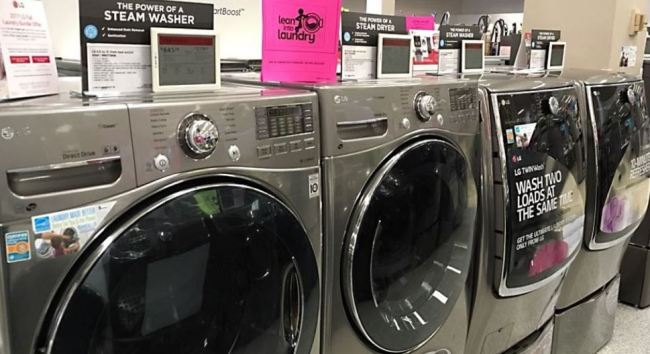South Korea’s washing machine exporters to the US, Samsung Electronics and LG Electronics, on Wednesday said they will start operations of their new plants in the US as early as possible to minimize the possible impact of a likely sanction on their products.
Samsung and LG on Wednesday expressed concerns about the US International Trade Commission’s recommendation to the Donald Trump administration to impose a 50 percent tariff rate on large residential washer imports that exceeded a quota of 1.2 million units for a duration of three years in addition to the current rates of duty.

(Yonhap)
The recommendation included an option to impose an additional tariff of 20 percent for units below the quota for the same period, which would decline to 18 percent in the second year and 15 percent in the third year. It also suggests a 50 percent tariff on covered parts of the imported washing machines that exceed a quota of 50,000 units in the first year, with the tariff rate being decreased by 5 percentage points in the next two years while the quota volume increases by 20,000 units each year.
Such import restriction, known as a safeguard, will be implemented for the first time in 16 years if the Trump administration approves it by early next year.
In 2002, the George W. Bush administration imposed an 8 to 30 percent duty on imported steel.
“In preparations against the possibility of the US government issuing the safeguard measure, LG will seek a plan to move forward operation of the Tennessee factory currently under construction to minimize the impact,” LG said in a statement.
LG is building a $250 million washer factory in Tennessee with an annual capacity of 1 million units by the first quarter of 2019.
The new measure would apply only to Samsung and LG washers manufactured overseas, not in Korea.
Both Samsung and LG are manufacturing washers exported to the US in Vietnam and Thailand. A combined volume of the washer imports to the country is estimated to be over 2.5 million units a year, according to the industry.
The recommendation was made in response to a safeguard petition filed by US-based Whirlpool in May. Whirlpool tops the US washer market with around 40 percent market share, but the combined share of Samsung and LG of around 30 percent has been consistently increasing.
Whirlpool had demanded a flat tariff rate of 50 percent on all units, along with quotas on imported parts. Samsung and LG had counter-proposed a 50 percent tariff on units exceeding a quota of 1.45 million.
On the ITC decision, Samsung said that such a measure would limit choices of American consumers. And the company is concerned of the possibility of the new in-quota option being approved by President Trump.
“Samsung currently pays 1 percent tariffs on washers being produced in Vietnam and Thailand, and the difference between 1 percent and 20 percent is huge for exporters,” a Samsung official said.
Samsung is also building a $380 million plant in South Carolina with a schedule to embark on operations by early next year.
“It will take some time to localize all parts procurements for washing machines, although the factory starts working,” the official said. “It is not certain yet to say how much the new factory can help reduce the safeguard impact.”
Trade experts view such a restriction on washer imports would affect US consumers more than the exporters.
“In the past when the US imposed similar tariffs on Japanese cars, US consumers had to suffer overall increases in automobile prices in the country, while Japanese carmakers weren’t hurt much,” said Junsok Yang, professor at The Catholic University of Korea. “Because Whirlpool isn’t as good as Korean companies in producing high-quality products, such a restriction may undermine consumer choices there while leaving the prices go up.”
Taking it as a serious measure, the Ministry of Trade, Industry and Energy will seek countermeasures, including a legal action against the US government, if the Trump administration chooses to slap the tariffs as the ITC has recommended.
”Under the Korea-US Free Trade Agreement, the washers built by Korean companies are not subject to such US restrictions,“ the ministry said in a press release. ”Our basic stance is that the US government adopts a remedy that is acceptable by the related industries. The Korean government will consider seeking a legal action with the World Trade Organization by the time the US president makes a decision.”
Trade officials at the government and Samsung and LG will make efforts to express their opposition to such ITC remedy to US politicians and government officials, hoping it to be heard by President Trump, the ministry said.
By Song Su-hyun (song@heraldcorp.com)






![[Graphic News] More Koreans say they plan long-distance trips this year](http://res.heraldm.com/phpwas/restmb_idxmake.php?idx=645&simg=/content/image/2024/04/17/20240417050828_0.gif&u=)